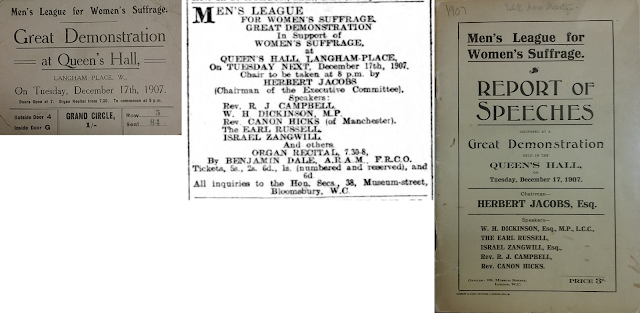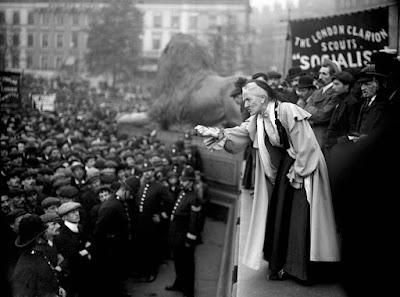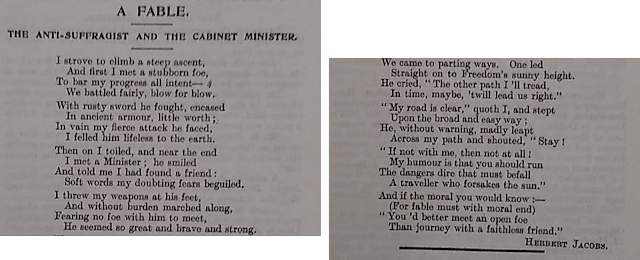According to the Men's League's first Annual Report in 1908, it was inaugurated at a meeting on the 2 March 1907 in Jacobs' office at 1, Harcourt Chambers in the Inner Temple. Three years later he was standing for parliament on a women's suffrage platform. This episode will begin to tell the story of Jacobs' political career, and we'll start at the beginning....
....with female franchise supporter John Stuart Mill, who wrote The Subjection of Women in 1869, for which its author was lampooned in Punch:
 |
| "PRAY CLEAR THE WAY, THERE, FOR THESE - A - PERSONS" A cartoon by John Tenniel in 1867. He also illustrated "Through the Looking Glass" (1871), and it looks as if he recycled the haughty lady in white as the Red Queen, and Mill reappears as the Carpenter who walked with the Walrus. |
Awakening
Mill's treatise is hard going (for your blogger, anyway), but still packs a relevant punch 150 years later in view of the continuing asymmetry and inequality in male-female relations in spite of full suffrage since 1928. Jacobs, in an interview in 1910 in The Vote, acknowledged the influence of Mill on his own development, which dated, he said, from some "twenty years" before the formation of the League.
 |
| The Vote 6 August 1910, containing an interview with Mr Herbert Jacobs "one of the most brilliant exponents of the 'game of kings' who ever played for England" |
So we can link Jacobs' awakening to his association with Agnes Larkcom in the 1880s. You will remember, from episode 6, that in 1884 both Agnes and Herbert had letters published in the local press: he encouraged ladies to play chess and proposed a Croydon Ladies Chess Club, dismissing the notion that the game was "too abstruse" for the female intellect; Agnes's missive was more pointedly political. She objected to Liberal manoeuvering against franchise reform, and to those who claim "to know always better than women what is good for them." As for the legal position of women, Mill himself had said, provocatively perhaps, that within the marriage contract the woman's lot was worse even than that of the slave: at least, he wrote, slaves had time "off duty". He also wrote, credulously, "a female slave has (in Christian countries) an admitted right...to refuse her master the last familiarity", adding: "Not so the wife."
A further step on Herbert's political journey would have been his election in 1901 to the Eighty Club (London Daily News 22 Feb), aligned to the Liberal Party and offering to provide speakers to promote the Liberal message. One on-line archival document recording its activities in 1894 (when it claimed over 600 members) itemises a goodly number of convivial house-meetings, dinners, and speeches (to which the ladies were admitted in order that they might listen; but only after dinner).
In the first decade of the 20th century some female suffrage campaigners felt driven to more militant agitation: and thus, for example, many were arrested - fitted-up or not - in February 1907 for disorderly conduct trying to get into Parliament, were tried and sent down. This, though, may not have been the planned and intentional law-breaking of the "suffragettes" (the belittling epithet defiantly adopted by those women prepared to break windows, rip paintings, etc).
 |
| Taunton Courier 20 Feb 1907 |
Ten were released after 7 days inside. They celebrated their freedom with breakfast at Anderton's Hotel (also a favoured haunt of the chess fraternity), after which "one of the ladies present attracted considerable attention by smoking a cigarette." (Yorkshire Post 21 Feb 1907). Also present, and seconding the resolution to welcome the ladies' return, was Herbert Jacobs: "he said he could not blame very much those who broke the law of 1799....he thought it would be a good thing if a few men were to band together to declare they would take no part in public affairs or help in any reform until women's suffrage was granted. Such a society, he was sure, would grow until no Government could resist it. (Hear, hear)." (Sheffield Independent 21 Feb). That law of 1799 was, I think, the Combination Act enacted to outlaw trade union organisation.
The Men's League for Women's Suffrage
In the 1910 interview Jacobs himself refers back to that reception and how, in calling for the formation of a "society", he was hoping someone else would do it. But Charlotte Despard "forced his hand" by sending "members" along assuming it was already up and running. His presence at Anderton's Hotel demonstrates that he already had more than a minor presence in the suffrage movement, and was well-known to its leading lights. Indeed, in that same interview (see Appendix 1) Jacobs says he was for a short time a member of the Committee of the Central Society (a suffrage umbrella organisation). It had split in 1888, but it is not clear which faction he went with (John (2000)). That date would put Jacobs in the thick of things since his mid-twenties, and the year of his marriage.
"...in order to enable men sympathisers with the cause of Women's Suffrage to band themselves into a separate organisation, and thus to concentrate the electoral strength of the movement. It is non-party and non-militant, but contains sympathisers with all phases of the Women's Suffrage movement [to which] it has given help in all constitutional ways..."
 |
| From The Men's League Handbook on Women's Suffrage (1912) (Click on to enlarge) Available in the British Library, and The Museum of London. |
At the time of its formation, the Pall Mall Gazette (9 March 1907) noted that the League offered two classes of membership: Class B, ordinary supporters, but also "Class A" members who - as Jacobs was reported as spelling out - undertook to "vote against Government candidates if they had not adopted a measure for the enfranchisement of women".
This focus on the "constitutional ways" (evident from the contents of the Handbook above), and Herbert's legalistic bent, were to be a source of irritation for some members of the League, including the war journalist Henry Nevinson who was "particularly critical of 'lawyer Jacobs'" (John (2000): Nevinson went off to help form the more militant Men's Political Union for Women's Franchise in 1910. In a rare appearance of Jacobs in the academic press, Professor John describes him as "an international chess champion" (p 156): which, to be pedantic, is not strictly speaking correct. Nor, now to defend his reputation at the chess board, would it do justice to his enterprise and will to win (as this blog series has shown) to say only that he was "not a man who made hasty moves" - though that may of course accurately characterise his professional caution. Professor John's fascinating research also tells of socially liberal but sometime Tory local councillor, Cecil Chapman. He was also an enlightened magistrate - after successfully challenging Jacobs for MLWS chair in 1911, he was lent on by the court authorities to stand down. Herbert returned to the Chair shortly afterwards. She has also identified over 950 members, at some time or other, of the League, with a high count of lawyers and other professionals.
The MLWS's adherence to legality limited it to public pronouncements and lobbying, organising its rallies or "great demonstrations" (as it called them), and setting up speakers' platforms in Hyde Park or in the street. Herbert Jacobs was an energetic participant, along with his duties as chair of the League.
 |
| Left: Jacobs billed at a WSPU meeting with Charlotte Despard (courtesy of the Women's Libary LSE) Right: WLWS handbill (courtesy and © of the Museum of London) |
Busy Man
To give some examples from his busy schedule: he spoke at a Women's Social and Political Union meeting, 1 May 1907, in Hornsey, alongside the redoubtable Charlotte Despard (see above left); and he was billed for the Reading Women's Suffrage Society on November 26 alongside Mrs Fawcett (Berkshire Chronicle 26 October 1907). Jacobs ended up chairing the meeting, which was "of an exceptionally lively character... by way of retaliation for the scenes created by women suffragists all over the country" (op cit 30 November). Jacobs was mercilessly barracked by "unsympathetic males" armed with musical instruments, horns, bells and rattles, and a lively repertoire of popular songs including "Chin, Chin, Chinaman" and "The Galloping Major". In a rare piece of reportage concerning his personal attributes, Jacobs was said to have a "high-pitched voice" - which invited mimicry from the assembly. Judging from the account, his rather patrician handling of the mob may not have helped the situation. Clearly the Chronicle's reporter enjoyed himself, and it all ended peacefully under the eye of the local Constabulary.
Herbert would have had an easier ride at the Men's League's own "Great Demonstration" of December 17th 1907 at the Queen's Hall (see docs below). This was of course a significant event for the League being its first major outing. All seats were sold, and the League was able to set out its stall. They published a full report of the speeches, including Jacob's own Chairman's welcome (reproduced as an Appendix 2), and an account of how he dealt rather more successfully with a persistent heckler.
 |
| The 1907 MLWS Great Demonstration. Ticket and Report Cover: Courtesy and © of the Museum of London. Notice: The Daily News Dec 11 1907 |
Here we can note another of Jacobs' responsibilities as chair of the MLWS in its strategy of constitutional intervention in the political process: he wrote to, and published the replies from, the candidates in the Jarrow by-election of June 1907 (Jarrow Express 21 June), though it is not clear from other reports in the same paper whether the Mr Cooper referred to below was actually contesting the seat.
 |
March 1908 saw the first anniversary for the League - something Herbert referred to when making "an interesting speech" in Petersfield (Portsmouth Evening News 30 March) - and the publication of its first annual report. It also saw him getting the brush-off from the Prime Minister Herbert Asquith, who refused an international delegation on the grounds that "he is aware of the facts" and so saw no useful purpose in being lobbied by "a deputation of several Colonies and foreign countries where women possess the franchise." (Sheffield Independent 24 Oct). The P.M.'s obdurate refusal was reported widely in the press, possibly by the contrivance of the League.
In 1909 the League held another mass rally, or "demonstration" in January, and published the speeches.
 |
| Courtesy and © The Museum of London |
Jacobs was in the Chair and did a kind of warm-up act, poking fun at a "rival organisation": the Men's League for Opposing Women's Suffrage. Its emergence was "a tribute to our own success" he said, pointing out that his own pro-suffrage League now had branches in Edinburgh, Manchester, Liverpool, Bristol...etc. In April he was speaking at the week-long Congress of the International Women's Suffrage Alliance in London - representatives of 21 countries attended. (Times and Western Daily Press April 26 and 27).
Jacobs didn't neglect his chess in this period, for example he played in the Scarborough British Championships in August 1909 - finishing 10th in a field of 12, but his mind may have been on other things. The League's monthly paper first appeared in October 1909. Its initial issue reported on their "Open Air Campaign" at which Jacobs presided at the North Plinth in Trafalgar Square, and he was in Hyde Park, again, on October 17th. He was at a Women's Suffrage meeting in Sheffield just as a local branch of the League was to be established (Sheffield Evening Telegraph 26 Nov), adding to the list above.
Also reported was his participation in a debate at Morley College (a liberal adult education institution in London) on 2nd October which illustrated the type of opposition faced by the suffrage movement. Addressing a meeting on “the case against women’s suffrage”, a Mr Drywood said "if women were entitled to votes, why not animals?” Common sense prevailed and the resolution was lost 49 to 17 “amid loud applause”. Herbert was noted in issue 3 (December 1909) signing a letter from the League protesting at the treatment of suffragette Charlotte Marsh sentenced to six weeks hard labour and barbarically force-fed when on hunger strike - she was one of the first. The Government reply was unyielding. You have to pinch yourself. This stuff actually happened. Here.
The following year, 1910, April (Issue 7): and Herbert was again chairing a rally from the North Plinth in Trafalgar Square...
 |
| Not Herbert, but the 66 year-old Charlotte Despard speaking in Trafalgar Square in 1910, against unemployment. |
...and in July (Issue 10) leading a march of the Men’s League, "striding out in front of the banner, holding fast to the guiding rope". And so what if he "was unapplauded? His fame at the chess board is assured” - being another rare reference in this context of Jacobs' other pursuit (see also the interview in The Vote in Appendix 1 for another, longer, one). July also saw a debate at the above-mentioned Eighty Club on Women's Suffrage, at the Hotel Metropole. His anti-suffrage opponent provoked "undisguised hilarity at [his] casuistical arguments which would have sounded prehistoric to an eighteenth-century Tory…Mr Herbert Jacobs undertook the not very difficult task of refuting Dr Hart. The audience much appreciated his subtle shafts of ridicule, and must have been reminded of a gorgeous Spanish Galleon riddled by a swift Elizabethan captain" (Issue 10) - another sighting of Herbert besting the Iberian foe (see game in the previous episode).
Parliamentary Procedure
Looking at the bigger picture: for too long the Ministers of the day were wont to affirm their support for women's suffrage in principle, while doing nothing about it, or worse, in practice: thus frustrating any legislative progress. Against the backdrop of all the legal rallying, marching and campaigning (leaving aside suffragette direct action "militancy")...
 |
| The Men's League in action, Walthamstow October 1910. Mrs Louis Fagan spoke in Leyton on 31 October (Men's League paper November 1910) |
...there had been much discussion in the Men's League of parliamentary tactics, and of tabling lowest common denominator Bills or Amendments which, although falling well short of demanding female suffrage without qualification (there was, incidentally, no universal male suffrage at this point), could command majority support across all sides of the House, thus cornering the Government. This parliamentary arena was of course male territory. Great efforts were put into constructing this alliance through the medium of an all-party Conciliation Committee, supported by the Men's League (see the contents of the Handbook above).
The duplicity of Government Ministers was put into poetic form by Jacobs in a "Fable". It appeared in September 1910 (Issue 12 of the MLWS paper)
 |
| Courtesy and © The Museum of London |
As for the non-militant women's campaign, in April 1910 the National Union of Women’s Suffrage Societies decided to run candidates at the next General Election in constituencies "where the sitting member holds his seat by only a small majority, and is an Anti-Suffragist". This of course required that men should put themselves forward on a suffrage platform. In June the League's paper reported that Joseph Clayton (a MLWS member) was "selected by" the National Union to stand as an independent to fight “that notorious Anti-Suffragist, Mr Hillaire Belloc, the present MP for South Salford” - infamous for such remarks as: "I call it immoral...bringing of one's women...into the political arena disturbs the relation between the sexes" (given here).
Then, in the General Election of December 1910 Herbert stood in St. Pancras East, as a Women's Suffrage Independent. We will see what happened next time.
Acknowledgements
With thanks to the staff at the Women's Library LSE, and the Museum of London Archive.
References
Angela V. John, Between the Cause and the Courts: The Curious Case of Cecil Chapman, in Eustace, Ryan and Ugolini (eds), A Suffrage Reader. Charting directions in British suffrage history, Leicester University Press, 2000.
John Stuart Mill, The Subjection of Women, (1869) and Mary Wollstonecraft, A Vindication of the Rights of Woman (1792), first published together in Everyman's Library, 1929.
Previous episodes: 1. Beginning in Croydon; 2. Brixton, Benedict and Bar; 3.City Champ; 4. Congress Man; 5. A Load of Old Cablers; 6.Engaging Agnes; 7. Congress Man Replayed; 8. Madame Larkcom; 9. Jacobs Crackers;.....14 Still at the Bar 15. Down the Line
Appendix 1
Interview in the Vote 6 August 1910
(Apologies for the poor quality of the reproduction)
(Click on to enlarge)
Appendix 2
Speech to the 1907 Great Demonstration
(Click on to enlarge)


1 comment:
The chairman (and founder) of the Men's League does not permit the heavy work of the British Chess Tournament at Scarborough to release him from his obligations to the cause of Women's Suffrage. Two meetings — at the West Pier and at Ayton, near Scarborough—have been addressed by Mr. Herbert Jacobs in the last week. Mr. A. M. Coleman presided at the West Pier, and Mr. Herbert Jacobs at Ayton. Both meetings were held under the auspices of the National Union. Another devoted Suffragist, Mr. H. W. Nevinson, at present a special correspondent at Barcelona, cannot keep allusions to Holloway out of his extremely interesting letters to The Daily News.
Women's Franchise - Thursday 19 August 1909 p7
Post a Comment